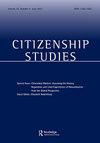The dynamics of localized citizenship at the grassroots in China
IF 1.9
3区 社会学
Q3 POLITICAL SCIENCE
引用次数: 0
Abstract
ABSTRACT Grassroots organizations in urban and rural China offer intriguing perspectives for citizenship studies, this article argues. Paradoxically perhaps, China is one of the few places where the right to self-government is recognized in law, through the medium of these local semi-state committees. China’s response to Covid reaffirmed their importance, revealing how they (variably) organize urban and rural residents. In ordinary times, such committees create a public space theoretically open to all locals where collective norms can be formed and contested, and claims on state resources can be asserted, and are thus a locus for citizenship. Such ‘local citizenship’ has analogues in many societies, but in the Chinese context its strong collective orientation and its physical anchoring where people live means that it can be a space in which people’s needs may be made visible and thus for a politics of citizens, even at a time of increasingly authoritarian government.中国基层本土化公民的动态
本文认为,中国城乡基层组织为公民身份研究提供了有趣的视角。也许矛盾的是,中国是少数几个通过这些地方半国家委员会在法律上承认自治权的地方之一。中国对新冠肺炎的反应重申了它们的重要性,揭示了它们如何(可变地)组织城市和农村居民。在平时,这些委员会创造了一个理论上向所有当地人开放的公共空间,在这里可以形成和质疑集体规范,可以主张对国家资源的主张,因此是公民身份的场所。这种“地方公民身份”在许多社会中都有类似之处,但在中国背景下,它强烈的集体取向和人们生活的物理锚定意味着,即使在政府日益专制的时候,它也可以成为一个让人们的需求可见的空间,从而成为公民政治的空间。
本文章由计算机程序翻译,如有差异,请以英文原文为准。
求助全文
约1分钟内获得全文
求助全文
来源期刊

Citizenship Studies
POLITICAL SCIENCE-
CiteScore
3.60
自引率
11.10%
发文量
85
期刊介绍:
Citizenship Studies publishes internationally recognised scholarly work on contemporary issues in citizenship, human rights and democratic processes from an interdisciplinary perspective covering the fields of politics, sociology, history and cultural studies. It seeks to lead an international debate on the academic analysis of citizenship, and also aims to cross the division between internal and academic and external public debate. The journal focuses on debates that move beyond conventional notions of citizenship, and treats citizenship as a strategic concept that is central in the analysis of identity, participation, empowerment, human rights and the public interest.
 求助内容:
求助内容: 应助结果提醒方式:
应助结果提醒方式:


